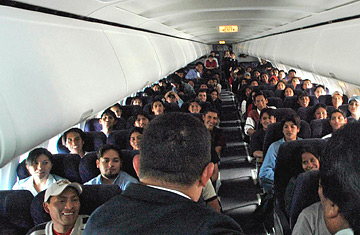
Passengers on an airplane at the airport in Caracas.
I of course said no: I had a reporting assignment, and besides, anyone who's tried to travel to Venezuela these days knows there might not be another day. For all the talk of their leftist President Hugo Chavez about "21st-century socialism," Venezuelans are flying around the world like capitalist nouveaux riches as a result of all that oil wealth pouring in, filling the seats on almost every flight for the foreseeable future to and from Caracas from destinations ranging from Miami to Madrid.
The travel boom is reminiscent, in fact, of Venezuela B.C. (Before Chavez), in the 1970s and early '80s, when soaring oil prices earned the country the nickname "Saudi Venezuela," and even its middle class was famous for taking weekends in Miami as casually as New Yorkers head to the Hamptons. A few years ago, flights between Miami and Caracas were usually full only during the holiday season; but this year, with Venezuelan flight sales up almost 50%, it's like Christmas in September as Venezuelans crowd into 767s with their Miami mall treasures. One woman on my flight even carried on a large keyboard.
Since American, which has a virtual U.S. airline monopoly in Latin America, was charging me a full, round-trip coach fare of almost $1,300 for a less than three-hour round-trip flight, I took guilty pleasure in watching its flight attendants rush up and down the aisles shouting things like, "Senora, you can't put a piano in the overhead bin!"
Nor is the rush to Caracas confined to Venezuelans. Spurred on by Chavez's anti-U.S. policies, Chinese, Indian, Arab and Iranian oil executives — as well as American lefty tourists who want to bask in the Bolivarian Revolution — are also pouring in. Finding a flight is just the first test; hotel rooms in Caracas are often as hard to come by as vacancies in Manhattan during the U.N. General Assembly — and almost as expensive. As are restaurants and taxis: a ride from Simon Bolivar International Airport into Caracas, which cost about $25 a couple of years ago, is usually more than $50 today.
I was also lucky to get a direct flight. Flying into or out of Venezuela these days often involves an odyssey circuitous enough to tax Homer's imagination. A Venezuelan chef friend of mine in Miami came out of the kitchen one recent night to recount how he'd had to stop in Puerto Rico and Colombia in order to fly to and from Venezuela. "I spent a day and a half just to cross the Caribbean," he said. "It's all gone nuts."
Part of the problem is a lack of sufficient flights, partly as a result of politics. Thanks to the tit-for-tat pattern of relations between the U.S. and Venezuelan goverments — Bush and Chavez insult each other, Bush downgrades the U.S. safety rating of Venezuela's aviation system, Chavez rejects requests from U.S. airlines to schedule more flights into Caracas, and so on — major carriers such as United and Delta hardly ever fly to Venezuela any more.
At the same time, Venezuelan carriers such as Aeropostal and Avior don't have the fleets necessary to expand their own flight schedules, even for domestic travel. (I'd planned to fly to Venezuela's east coast and interview a state governor this week, but, you guessed it, I was told there were no available flights.) "Most of my clients used to plan their travel day by day," says Winston Brito, manager of the Arlette Tours travel agency in Caracas. "Now they can barely plan month by month, and it's only going to get worse unless there's major new investment in Venezuelan airlines."
The flight frustration, however, simply points up Venezuela's larger reality — and paradox. Chavez's revolution seems to be populated as much, if not more, by capitalist-minded consumers as by communist-minded comrades. While U.S. car salesmen are practically giving away autos, most Venezuelan dealerships report waiting lists — even for luxury BMWs, which are enjoying record sales in the Chavez years. And gleaming new shopping malls, like the almost completed Sambil center in Caracas's Candelaria district, are sprouting up as prodigiously as government decrees to nationalize businesses. The downside to swimming in so much oil money, however, is that Venezuela's annual inflation rate — currently about 16% — is the highest in Latin America.
Then again, frequent-flying Venezuelans can always argue that they're simply emulating their peripatetic comandante, whose ambitious international agenda often gets him criticized for spending more time abroad than at home. When I got into my Caracas hotel room on Sunday, I caught Chavez hosting his weekly television show, Alo Presidente! (Hello President!). He was musing about possibly going "into the deepest jungle of Colombia" to help mediate peace talks between the Bogota government and leftist guerrillas. "You can make plans like that on the spur of the moment, Hugo!" I shouted at the TV. "You've got a presidential jet!"
